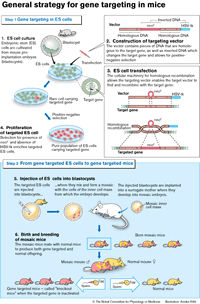Israelis Turn Human Stem Cells Into Heart Cells
Scientists said on Wednesday that they had grown heart cells from human embryonic stem cells, an important step toward harnessing the transformational qualities of these primitive master cells to regenerate tissue damaged by cardiac disease. Israeli researchers said they had created early-stage human heart cells in petri dishes using stem cells derived from an embryo just days after fertilization. They said they envisioned using these cells, after refining the process, to reverse damage inflicted on cardiac muscle by heart attacks.
``It was shown for the first time definitely that the cells that are being created are cardiac cells that show electrical, biochemical and morphological characteristics of early or young cardiac muscle,'' Dr. Joseph Itskovitz-Eldor of the Faculty of Medicine and Rambam Medical Center in Haifa said in a telephone interview.
The publication of the study in the Journal of Clinical Investigation comes as President Bush (news - web sites) considers whether to permit federal funding of research involving human embryonic stem cells.
Embryonic stem cells can be viewed as the body's early building blocks. Their wondrous ability to transform themselves into virtually every cell type enables the embryo to grow from a round ball of a few cells into a fully formed body.
Researchers are hoping to use stem cells to create therapies for a variety of illnesses, including heart disease, one of the leading causes of death worldwide.
``The idea is that if you now have a source for heart cells, in the future you can transplant them into a nonfunctioning area (of the heart) and possibly replace the cells,'' said Dr. Lior Gepstein of the Technion-Israel Institute of Technology Faculty of Medicine, an author of the study, along with colleagues including Itskovitz-Eldor and Dr. Izhak Kehat.
``When we have a heart attack, the area of the heart that doesn't receive blood supply actually dies and is replaced by scar tissue,'' Gepstein added. ``Because the adult heart doesn't have any regeneration capacity, this area in the heart won't contract anymore (to pump blood). So this can lead to deterioration in heart function and eventually to heart failure.''
The goal would be to inject the early-stage human heart cells created in the laboratory using stem cells into the damaged area and create healthy cardiac muscle that restores heart function, the researchers said.
Other researchers recently reported they had used mouse stem cells to create mouse cardiac cells.
The Israeli researchers used human embryonic stem cells to grow an undifferentiated mass of cells using a standard laboratory technique. They then sought to steer the multiplying cells toward transformation into cardiac cells by optimizing the conditions in the petri dish.
As the cells divided, the cells aggregated into microscopic clumps. In about 10 percent of these, the researchers detected small groups of cells that were contracting spontaneously just like cardiomyocytes -- the cells that develop into heart tissue in an embryo.
The researchers then put these groups of cells through a battery of tests to confirm that they were cardiomyocytes and thus destined to differentiate into mature heart cells.
The researchers said the cells checked out in every way, including the genes they activated, the proteins they possessed, their electrical activity as they regularly contracted like a beating heart, their use of calcium and their response to hormones such as adrenaline.
``These are heart cells,'' Gepstein said. He said the researchers still needed to devise a way to increase the number of these cells produced in the laboratory. Noting that 90 percent of the cells created in the experiment were not heart cells, he said the researchers were exploring different combinations of chemicals to induce the stem cells to produce pure cultures of cardiomyocytes.
Other news from the department science

Get the chemical industry in your inbox
By submitting this form you agree that LUMITOS AG will send you the newsletter(s) selected above by email. Your data will not be passed on to third parties. Your data will be stored and processed in accordance with our data protection regulations. LUMITOS may contact you by email for the purpose of advertising or market and opinion surveys. You can revoke your consent at any time without giving reasons to LUMITOS AG, Ernst-Augustin-Str. 2, 12489 Berlin, Germany or by e-mail at revoke@lumitos.com with effect for the future. In addition, each email contains a link to unsubscribe from the corresponding newsletter.




























































